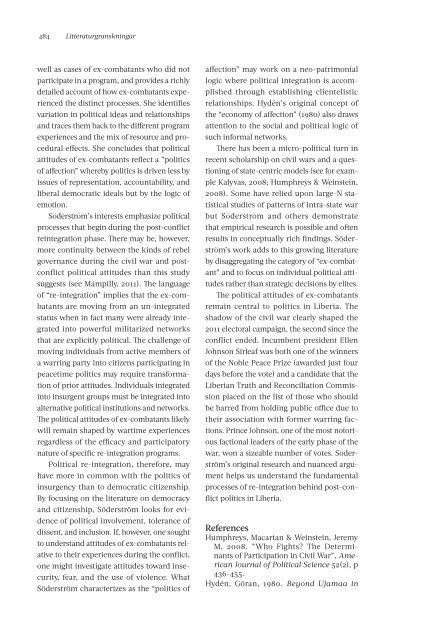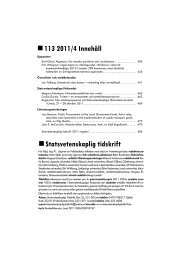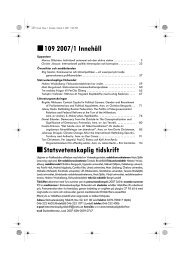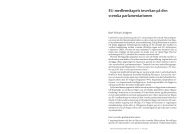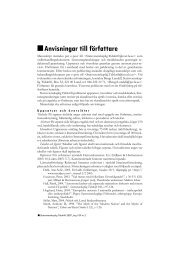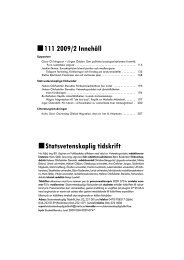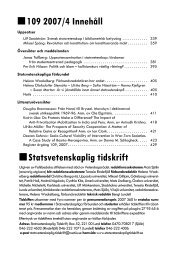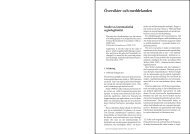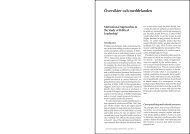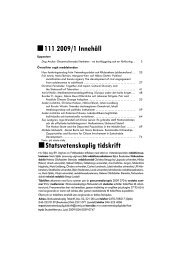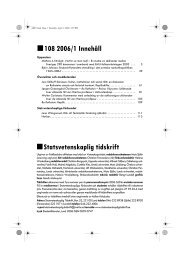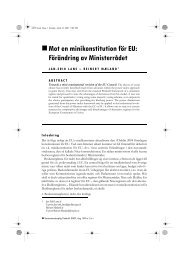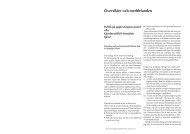Helt nummer 2012/3 (PDF, 1387 kb) - Statsvetenskaplig tidskrift
Helt nummer 2012/3 (PDF, 1387 kb) - Statsvetenskaplig tidskrift
Helt nummer 2012/3 (PDF, 1387 kb) - Statsvetenskaplig tidskrift
Create successful ePaper yourself
Turn your PDF publications into a flip-book with our unique Google optimized e-Paper software.
484 Litteraturgranskningar<br />
well as cases of ex-combatants who did not<br />
participate in a program, and provides a richly<br />
detailed account of how ex-combatants expe-<br />
rienced the distinct processes. She identifies<br />
variation in political ideas and relationships<br />
and traces them back to the different program<br />
experiences and the mix of resource and pro-<br />
cedural effects. She concludes that political<br />
attitudes of ex-combatants reflect a ”politics<br />
of affection” whereby politics is driven less by<br />
issues of representation, accountability, and<br />
liberal democratic ideals but by the logic of<br />
emotion.<br />
Söderström’s interests emphasize political<br />
processes that begin during the post-conflict<br />
reintegration phase. There may be, however,<br />
more continuity between the kinds of rebel<br />
governance during the civil war and post-<br />
conflict political attitudes than this study<br />
suggests (see Mampilly, 2011). The language<br />
of “re-integration” implies that the ex-com-<br />
batants are moving from an un-integrated<br />
status when in fact many were already inte-<br />
grated into powerful militarized networks<br />
that are explicitly political. The challenge of<br />
moving individuals from active members of<br />
a warring party into citizens participating in<br />
peacetime politics may require transforma-<br />
tion of prior attitudes. Individuals integrated<br />
into insurgent groups must be integrated into<br />
alternative political institutions and networks.<br />
The political attitudes of ex-combatants likely<br />
will remain shaped by wartime experiences<br />
regardless of the efficacy and participatory<br />
nature of specific re-integration programs.<br />
Political re-integration, therefore, may<br />
have more in common with the politics of<br />
insurgency than to democratic citizenship.<br />
By focusing on the literature on democracy<br />
and citizenship, Söderström looks for evi-<br />
dence of political involvement, tolerance of<br />
dissent, and inclusion. If, however, one sought<br />
to understand attitudes of ex-combatants rel-<br />
ative to their experiences during the conflict,<br />
one might investigate attitudes toward inse-<br />
curity, fear, and the use of violence. What<br />
Söderström characterizes as the “politics of<br />
affection” may work on a neo-patrimonial<br />
logic where political integration is accom-<br />
plished through establishing clientelistic<br />
relationships. Hydén’s original concept of<br />
the “economy of affection” (1980) also draws<br />
attention to the social and political logic of<br />
such informal networks.<br />
There has been a micro-political turn in<br />
recent scholarship on civil wars and a ques-<br />
tioning of state-centric models (see for exam-<br />
ple Kalyvas, 2008; Humphreys & Weinstein,<br />
2008). Some have relied upon large-N sta-<br />
tistical studies of patterns of intra-state war<br />
but Söderström and others demonstrate<br />
that empirical research is possible and often<br />
results in conceptually rich findings. Söder-<br />
ström’s work adds to this growing literature<br />
by disaggregating the category of “ex-combat-<br />
ant” and to focus on individual political atti-<br />
tudes rather than strategic decisions by elites.<br />
The political attitudes of ex-combatants<br />
remain central to politics in Liberia. The<br />
shadow of the civil war clearly shaped the<br />
2011 electoral campaign, the second since the<br />
conflict ended. Incumbent president Ellen<br />
Johnson Sirleaf was both one of the winners<br />
of the Noble Peace Prize (awarded just four<br />
days before the vote) and a candidate that the<br />
Liberian Truth and Reconciliation Commis-<br />
sion placed on the list of those who should<br />
be barred from holding public office due to<br />
their association with former warring fac-<br />
tions. Prince Johnson, one of the most notori-<br />
ous factional leaders of the early phase of the<br />
war, won a sizeable number of votes. Söder-<br />
ström’s original research and nuanced argu-<br />
ment helps us understand the fundamental<br />
processes of re-integration behind post-con-<br />
flict politics in Liberia.<br />
References<br />
Humphreys, Macartan & Weinstein, Jeremy<br />
M, 2008. ”Who Fights? The Determinants<br />
of Participation in Civil War”, American<br />
Journal of Political Science 52(2), p<br />
436-455.<br />
Hydén, Göran, 1980. Beyond Ujamaa in


